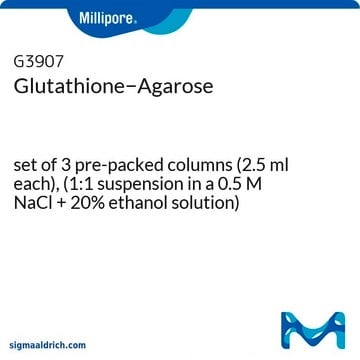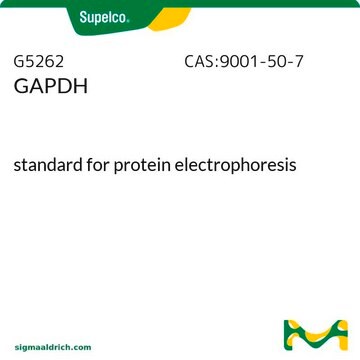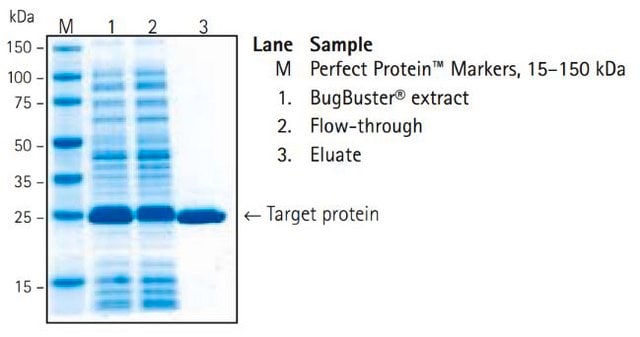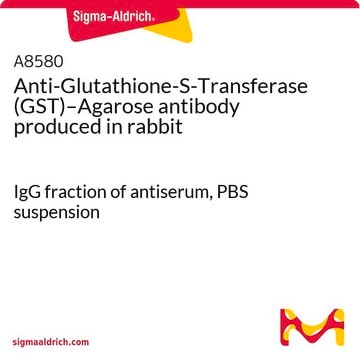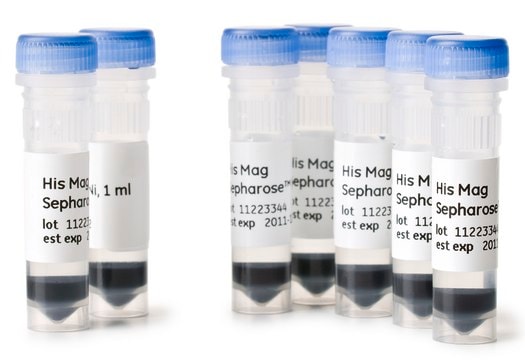G0924
Glutathione High Capacity Magnetic Agarose Beads
(1:1 suspension in a 30% ethanol solution)
Sinónimos:
Magnetic agarose beads
About This Item
Productos recomendados
conjugate
magnetic beads
Quality Level
form
(1:1 suspension in a 30% ethanol solution)
analyte chemical class(es)
proteins (GST)
technique(s)
immunoprecipitation (IP): suitable
protein purification: suitable
matrix
4% beaded magnetic agarose
matrix spacer
12 atoms
capacity
≥15 μmol/mL, agarose binding capacity
shipped in
wet ice
storage temp.
2-8°C
¿Está buscando productos similares? Visita Guía de comparación de productos
General description
The Glutathione Magnetic Agarose Beads are useful for affinity capture, molecular pull-down, or immunoprecipitation (IP) of proteins containing glutathione binding sequences, such as native glutathione S-transferase (GST), glutathione peroxidase, and glyoxalase I, or GST-tagged recombinant fusion proteins from cell lysates or other biochemical solutions while exhibiting low non-specific binding of other proteins. Recombinant GST-tagged proteins, bound to the affinity resin are separated with the use of a magnet. The magnetic properties allow for very rapid processing, as well as aid in manipulations, such as repetitive washings and recovery of the desired protein. This leads to faster recovery, experimental reproducibility, and more accurate quantitation of the proteins of interest.
The matrix of the magnetic beads is a 4% beaded agarose with an average diameter of 50 μ and a diameter range of 20-75 μ. Paramagnetic iron is impregnated within the beads.
Application
Physical form
signalword
Danger
hcodes
Hazard Classifications
Flam. Liq. 2
Storage Class
3 - Flammable liquids
wgk_germany
WGK 2
Certificados de análisis (COA)
Busque Certificados de análisis (COA) introduciendo el número de lote del producto. Los números de lote se encuentran en la etiqueta del producto después de las palabras «Lot» o «Batch»
¿Ya tiene este producto?
Encuentre la documentación para los productos que ha comprado recientemente en la Biblioteca de documentos.
Los clientes también vieron
Contenido relacionado
Análisis, reactivos y protocolos de precipitación pull-down para investigar las interacciones interproteicas in vitro utilizando métodos de atenuación de precipitación por afinidad o GST, purificación por afinidad en tándem (TAP) y coinmunoprecipitación.
Análisis, reactivos y protocolos de precipitación pull-down para investigar las interacciones interproteicas in vitro utilizando métodos de atenuación de precipitación por afinidad o GST, purificación por afinidad en tándem (TAP) y coinmunoprecipitación.
Análisis, reactivos y protocolos de precipitación pull-down para investigar las interacciones interproteicas in vitro utilizando métodos de atenuación de precipitación por afinidad o GST, purificación por afinidad en tándem (TAP) y coinmunoprecipitación.
Investigate in vitro protein-protein interactions with pull-down assays, utilizing affinity, GST pull-down, TAP, and co-immunoprecipitation methods.
Nuestro equipo de científicos tiene experiencia en todas las áreas de investigación: Ciencias de la vida, Ciencia de los materiales, Síntesis química, Cromatografía, Analítica y muchas otras.
Póngase en contacto con el Servicio técnico





